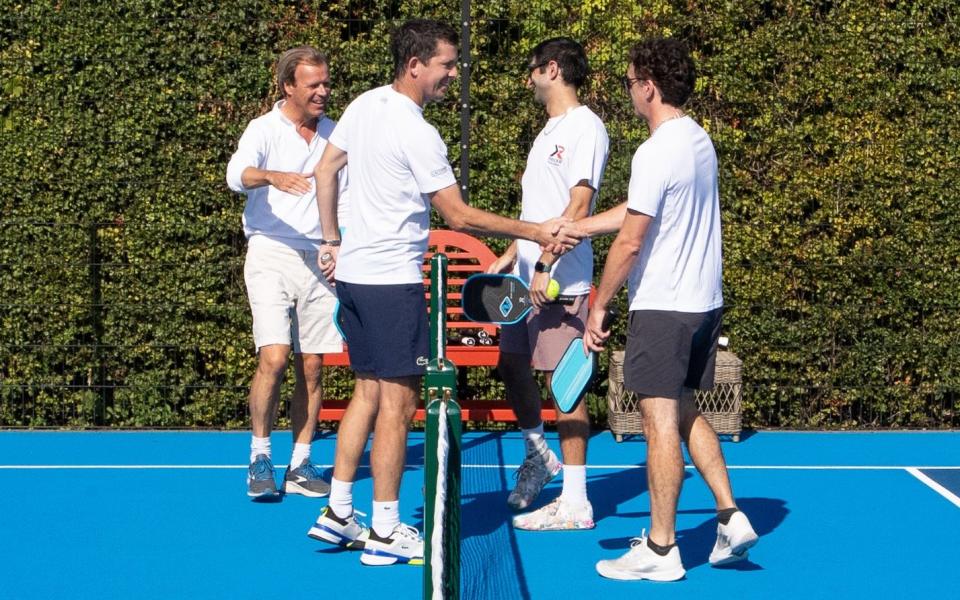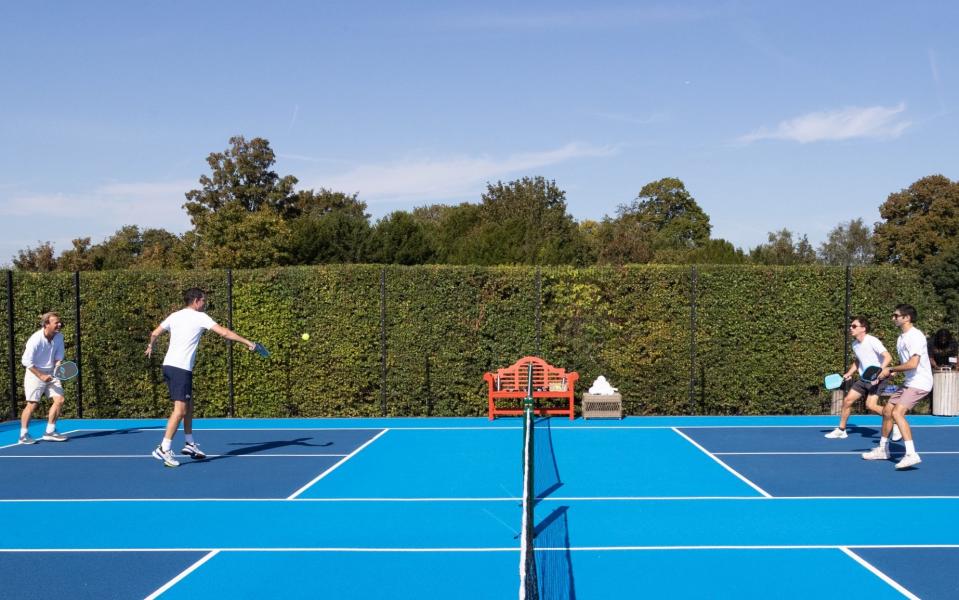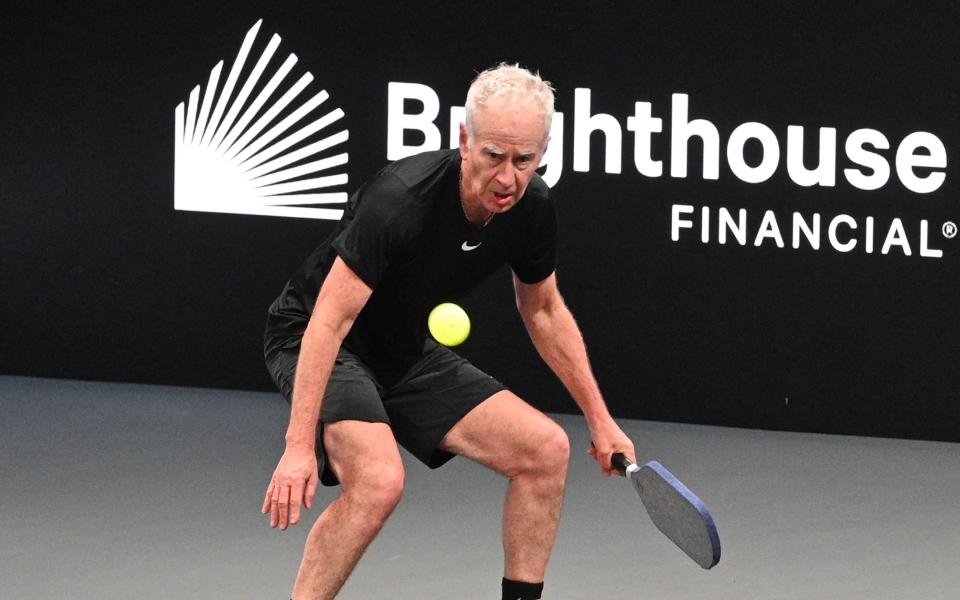My pickleball game with Tim Henman, body-bagging and all

“Ghastly people!” said Tim Henman, as he tossed up a yellow plastic ball and whacked it with a rectangular paddle.
Henman was bemoaning the lack of etiquette in pickleball – a new and feisty form of mini-tennis. When a pickleballer wins a point via a lucky net-cord, he or she is more likely to celebrate than to offer a Wimbledon-style apology.
And yet, despite Henman’s misgivings, he loves a contest and it wasn’t long before this famously buttoned-up athlete was firing winners in all directions, then offering his trademark crooked grin.
In a sport that drags all four players forward to the net, a serve-volleyer was sure to prosper. His shots were soon finding their mark – sometimes on the persons of his opponents, in a practice that insiders call “body-bagging”. I had a bruise above my left knee that lasted a week.
Pickleball is an American invention from the 1960s, conceived by a bunch of businessmen who wanted to entertain their fractious teenagers through a long summer holiday. But it’s only in the last decade that it has run wild in the US, like the racket-sport equivalent of Japanese knotweed.
On this side of the pond, progress has been slower. But last autumn I found a pickle party breaking out at Surrey’s Beaverbrook Hotel. Two tennis courts have been converted into four pickleball courts, making this the first hotel in the UK to offer the sport.
As a founding partner of Beaverbrook, Henman joined the launch day – although he needed a reminder of what he had signed up for. “Are you ready to film my first padel shot?” he asked, on entering the court for the first time. Right idea, wrong tennis offshoot, because the Beaverbrook padel court – which is encased in a squash-style wall – stands further down the hill.
As a pickleball virgin myself, I also required instruction from the two professionals leading the session –Thaddea Lock and James Chaudry. They demonstrated the correct form for the swing – more like an underarm toss than the sideways sweep used in tennis – and yelled “foot fault!” when I stepped forward into the no-go zone known as “The Kitchen”.
Expert though this tuition might have been, it wasn’t enough to carry me through a doubles match against Henman and his fellow Oxonian Laura Bailey, the model and photographer. Playing alongside Beaverbrook’s co-founder Joel Cadbury, I managed to stay out of The Kitchen, but still couldn’t handle the heat.
If this felt like a baptism of fire, it was partly because of my tactical naivety. When elite pickleball players get together, they slow the game down by patting the ball low over the net. These soft shots – known as “dinks” – cannot be attacked with any confidence, and also lead to a surfeit of those lucky net-cords I mentioned earlier.
Sadly, such sleight of hand was beyond me. And because I was serving up too many juicy high balls, the game – which is played to 11 points – seemed to unfold at light speed. I was often still contemplating my previous shot as Henman’s volleys whizzed past for winners – or landed in my breadbox. Because the teams stand no more than 15 feet apart, a champion pickleballer needs the reactions of a caffeinated rattlesnake.
A middling-sized crowd of well-heeled Beaverbrook guests and members was gathering, so Thaddea and James split us up into fours and put all the courts to use. Now the tinny sound of plastic ball on plastic bat multiplied into a genuine racket, punctuated by howls of rage or triumph. Imagine a grandfather clock in an interrogation centre: “Plick, plock, plick, Aaarrghh!, plick, plock, Yesss!, plock, plick.”

This distinctive pickleball sound has its critics. Not only is the plastic-on-plastic “plink” less aurally pleasant than the deep “thwock” of felt on strings, but there is more chatting and yelling because the players are so close to each other. That 15-foot distance makes for a very different dynamic to tennis’s 85ft plus.
Here is one reason why pickleball tends to be unpopular with planning committees. Fortunately Beaverbrook – a site once owned by wartime press baron Lord Beaverbrook – sits in its own private valley, well away from nimbyish neighbours.
While pickleball may still be a curiosity in the UK, it has already become a big noise in the States. There are nine million regular players, including such celebrities as Kim Kardashian and George Clooney. LeBron James is one of several basketball stars who own shares of professional pickleball teams, while such high-profile racket-wielders as Eugenie Bouchard and Sam Querrey have migrated across the net from tennis.
This rapid expansion has created a series of turf wars. Traditionalists are furious that tennis courts are being converted – the city of San Diego engaged a park-management expert to mediate between the two camps – and that TV channels are screening pickleball matches ahead of regular tour tennis. One ESPN blockbuster pitted Andre Agassi and Andy Roddick against John McEnroe and Michael Chang.

So where does Henman stand? A key member of the Wimbledon committee, he personifies the tennis establishment. Yet he sounded thoroughly relaxed – at this early stage – about pickleball’s arrival on the British scene. More than that, in fact: he sounded positively buzzed.
“I was really impressed by how diverse it is,” Henman told Telegraph Sport. “I’d seen it on TV in the States and not been all that interested. But when you’re playing, it has a lot of tactical elements, and rewards a smart thinker as much as someone who hits the ball hard. Also, from a participation point of view, the barriers to entry are much lower than in tennis. The ball is just much easier to control.”
Easy to control, hey? I knew that bruise wasn’t an accident.
Recommended
Racket sports at war: Pickleball and padel take on the LTA

